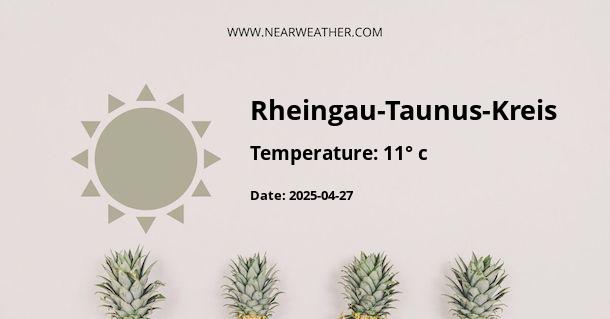Overview of Rheingau-Taunus-Kreis, Germany
Rheingau-Taunus-Kreis, situated in the federal state of Hessen, Western Germany, is a Landkreis (district) known for its scenic beauty, historical significance, and its unique climate. It stretches from the Rhine River in the south to the Taunus mountain range in the north providing it with a varied topography that substantially influences its weather patterns. This region is one of Germany's most renowned wine-producing areas, with the climate playing a vital role in viticulture here.
Climate of Rheingau-Taunus-Kreis
The climate of Rheingau-Taunus-Kreis can be classified as a transitional type between the oceanic climate (Cfb) and continental climate (Dfb) according to the Köppen climate classification. This means that the area experiences mild to warm summers and generally cold winters, with precipitation distributed fairly evenly throughout the year. Due to the diverse nature of the region's topography, microclimates are present which can exhibit variations in temperature and precipitation.
Seasonal Weather Patterns
Spring
- Spring in Rheingau-Taunus arrives by mid to late March, with temperatures gradually rising from an average low of around 0°C (32°F) to average highs of 15°C (59°F) by May.
- Precipitation during this period begins to increase, heralding the start of the growing season for vineyards and local flora.
- Spring is known for its unpredictable weather, with occasional late frosts or warm spells.
Summer
- The summers are warm, with July typically being the warmest month, where average highs can reach up to 24°C (75°F).
- Nighttime temperatures can be quite cool, with an average low of 12°C (53°F), which greatly benefits local grape cultivation by allowing vines to rest.
- While summer is the driest season, thunderstorms are frequent, feeding the rivers and reservoirs.
Autumn
- Autumn brings a gradual cooling, with temperatures dropping from a September average of 19°C (66°F) to November averages around 6°C (43°F).
- This season is significant for the wine industry as it is the period of harvest, with the cooler temperatures contributing to the sugar and acid balance in grapes.
- Fog can be common in the mornings and evenings due to the contrasting temperatures between the Rhine and the Taunus range.
Winter
- Winters are cold, but severe frosts are not extremely common. Average temperatures can dip to -1°C (30°F) in the coldest months.
- Snow is possible, particularly in the Taunus mountains, offering picturesque landscapes and opportunities for winter sports.
- While December is the darkest month, with only about 1.5 hours of sunshine per day, it is also a time for festive Christmas markets which are part of the area’s cultural allure.
Annual Weather Statistics
Rheingau-Taunus-Kreis experiences a temperate climate with slightly variable weather conditions throughout the year. Here are annual weather statistics indicating average temperature and precipitation patterns:
| Month | Average High (°C) | Average Low (°C) | Precipitation (mm) |
|---|---|---|---|
| January | 3 | -1 | 44.3 |
| February | 5 | -1 | 39.2 |
| March | 9 | 1 | 40.5 |
| April | 14 | 3 | 40.9 |
| May | 19 | 7 | 58.9 |
| June | 22 | 10 | 58.3 |
| July | 24 | 12 | 54.1 |
| August | 24 | 12 | 55.3 |
| September | 19 | 9 | 47.8 |
| October | 14 | 6 | 49.6 |
| November | 8 | 2 | 49.2 |
| December | 4 | 0 | 54.6 |
Note: Average weather statistics might vary slightly over years and are subject to change due to global climate patterns.
Influences on Local Climate
"The local climate of Rheingau-Taunus-Kreis is significantly influenced by the topographical features found within the region. The Taunus mountains act as a barrier and provide some protection from the cold winds of the north, while the Rhine River moderates temperatures, especially in the southern part of the district."
Climate Change Effects
Like many regions across the globe, Rheingau-Taunus-Kreis is experiencing the impacts of climate change. There have been shifts in precipitation patterns with some indications of increased incidence of extreme weather events such as storms and heatwaves. This has direct implications not only for daily life but also for the agricultural sector, particularly viniculture which is sensitive to climatic variations.
- Warmer average temperatures are leading to earlier budbreak and harvest dates in the vineyards.
- Increase in the frequency of extreme weather events may potentially damage crops and affect wine quality.
- Mitigation efforts are in place, including careful management of water resources and adoption of more resilient grape varieties.
Conclusion
The climate and weather in Rheingau-Taunus-Kreis offer a fascinating study into the interaction between earth's topography and meteorological phenomena. Understanding these patterns is critical not just for local residents but also for businesses that are climate-dependent such as the wineries that populate the region. With the advent of climate change, continuous monitoring and adaptation strategies are vital to preserve the natural beauty and economic prosperity of Rheingau-Taunus-Kreis.
A - Rheingau-Taunus-Kreis's Latitude is 50.168892 & Longitude is 8.074720.
A - Weather in Rheingau-Taunus-Kreis is 1° today.
A - Climate Conditions in Rheingau-Taunus-Kreis shows overcast clouds today.
A - Humidity in Rheingau-Taunus-Kreis is 81% today.
A - Wind speed in Rheingau-Taunus-Kreis is 11.27 km/h, flowing at 225° wind direction. today.
